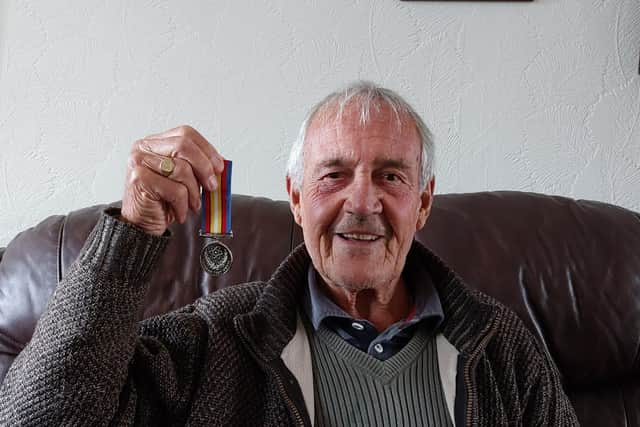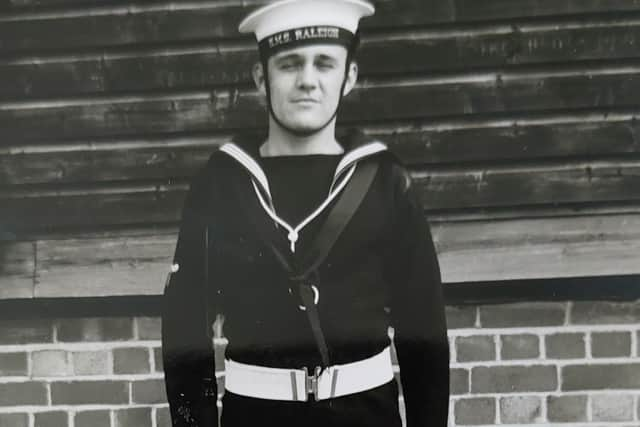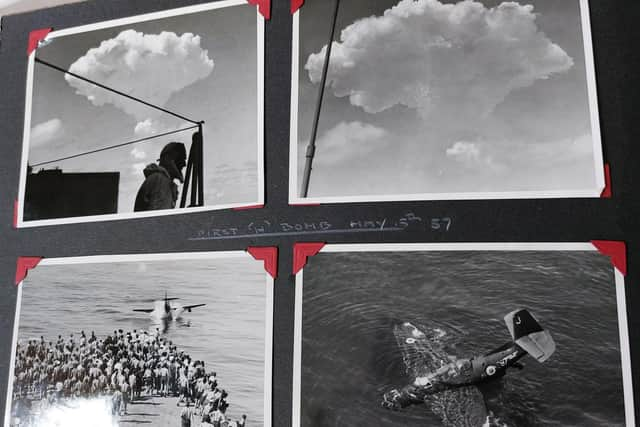'Danger never came into it' - Kettering man awarded medal for role in H-bomb test operation
and live on Freeview channel 276
Roy Constable has spent almost all of his life living in Kettering. He played football for the Poppies’ reserve side and worked as a clicker at shoemakers Loake, like many in the town did, for nearly 50 years.
But for a short period in his early adulthood – more than 7,000 miles from home – he was involved in a moment of history.
Advertisement
Hide AdAdvertisement
Hide AdHe was a fresh-faced 18-year-old when he joined the Navy as a National Service conscript before travelling to Christmas Island, in the Pacific Ocean, the following year in 1957 as part of Operation Grapple.


There, on May 15, he witnessed Britain’s first hydrogen bomb test – and now he’s received a Nuclear Test Medal for his service.
Roy, 86, said: “When you look back at it we should never have been in the position that we were put in. I enjoyed every minute and danger never came into it.
“When you’re 18 you think you know everything and you’re ready to conquer the world, but when you get there you’re such a small thing and just part of an operation. I never ever thought I was in any danger.”
Advertisement
Hide AdAdvertisement
Hide AdRoy trained in Devonport as a mechanical engineer before being transferred to aircraft carrier HMS Warrior, the operation’s control ship.


In January 1957 they set sail for Christmas Island to drop the H-bomb, but neither Roy or his colleagues knew the full details about the mission they were embarking on.
They went through a hurricane which smashed the bows of the ship and had to stop for repairs in Jamaica before traversing the Panama Canal and eventually arriving at the Pacific atoll in February.
Roy worked in desalination, turning salt water into drinking water, and was on Christmas Island when the Grapple 1 test bomb was dropped from an aircraft at high altitude over Malden Island, about 30 miles away, on May 15.
Advertisement
Hide AdAdvertisement
Hide AdHe remembers being told to turn his back before the bomb was dropped before seeing a flash, feeling the shockwave and then seeing the mushroom cloud take over the sky – all while wearing zero protective gear.


He said: “When we were all mustered together we were just told to turn our backs from the bomb itself because if you’d have been facing it it would have burnt your eyes.
"That was the only thing – we never had any protective clothing or anything.
“It was excitement more than anything. You wanted to see it.”
Advertisement
Hide AdAdvertisement
Hide AdOperation Grapple saw four series of British bomb tests in 1957 and 1958, with nine nuclear explosions taking place.
Some veterans – including Finedon man John Goodjohn who also received a Nuclear Test Medal – say they were used as human guinea pigs. Many believe that cancers and health issues have been consequences of exposure to radiation, but Roy said he is one of the lucky ones and is still ‘fit as a fiddle’.
He looks back on his time in National Service with fondness, having the opportunity to witness many things he never thought he would see.
Roy saw sharks for the first time – with the ship in shark-infested waters – as well as many birds.
Advertisement
Hide AdAdvertisement
Hide AdOn one occasion he was taken to see the Gilbertese native villagers who lived on Christmas Island, who offered him some octopus they were cooking in a pot – something he wishes he had taken them up on.
And his travels saw him cross the equator 14 times, travelling back through South America. Roy played football against the Peruvian and Chilean Navies and went to Buenos Aires, Montevideo and Rio De Janeiro, where he was lucky enough to watch a match at the famous Maracanã Stadium.
When he arrived home in October 1957 he still had some time of his National Service left and tried to go on another ship but, with not long left to serve, went to Portsmouth’s Victoria Barracks instead before his service ended in 1958.
More than 60 years later he has now received his Nuclear Test Medal, which arrived through his door in a Jiffy bag earlier this month while he was on holiday, recognising his participation in the tests.
Advertisement
Hide AdAdvertisement
Hide AdRoy said he would never have changed his service because he had a brilliant time.
He said: “I never thought anyone would do what I did. The world was a big place in those days and it’s a small place now.”